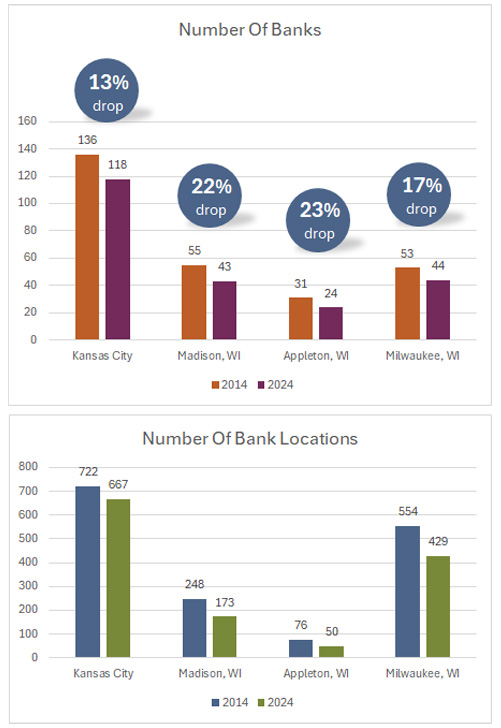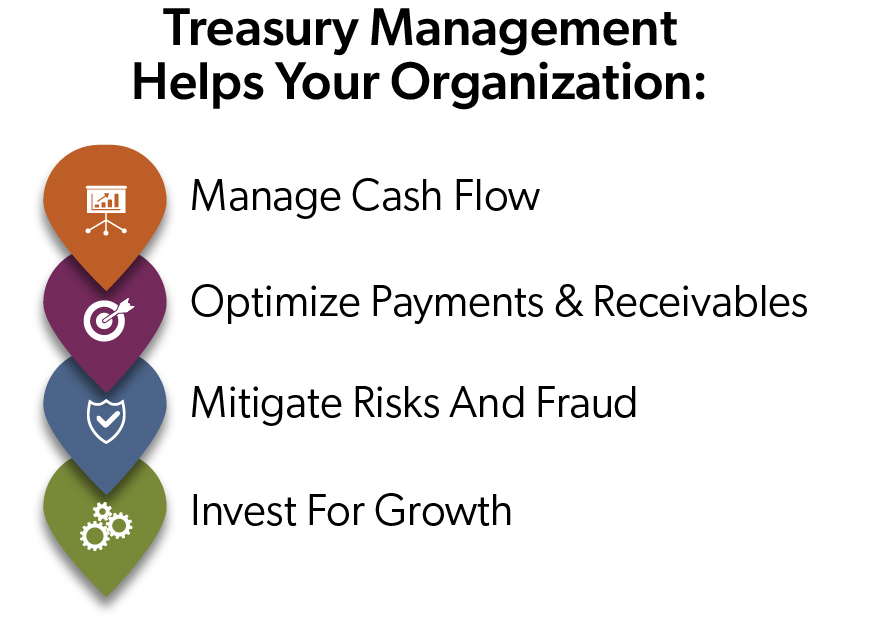Today's successful business leaders don't need a bank on every corner. They need attentive, accessible financial experts who understand their business and provide banking solutions that drive growth. While many banks are now reducing branches and adapting to digital transformation, First Business Bank was structured for this modern approach from its founding in 1990, providing businesses with secure digital tools and personalized help from experienced financial experts who come to you.
Why Are Bank Branches Closing Nationwide?
The bank branch closures reflect a few industry shifts over recent years. As businesses adapted to remote operations during the COVID-19 pandemic, they increasingly adopted digital banking solutions, like remote deposit capture. Increasing numbers of bank mergers also lead to branch closures as banks combine overlapping locations.
 According to the FDIC, the number of financial institutions dropped from 6,669 in 2014 to 4,549 in 2024 (32% fewer), with branches declining from 94,725 to 76,742 (19% fewer). The trend is clear in First Business Bank's key markets:
According to the FDIC, the number of financial institutions dropped from 6,669 in 2014 to 4,549 in 2024 (32% fewer), with branches declining from 94,725 to 76,742 (19% fewer). The trend is clear in First Business Bank's key markets:
- Kansas City MSA: 136 banks with 722 locations (2014) → 118 banks (13% drop) with 667 locations (2024)
- Madison, WI MSA: 55 banks with 248 locations (2014) → 43 banks (22% drop) with 173 locations (2024)
- Appleton, WI MSA: 31 banks with 76 locations (2014) → 24 banks (23% drop) with 50 locations (2024)
- Milwaukee, WI MSA: 53 banks with 554 locations (2014) → 44 banks (17% drop) with 429 locations (2024)
As many banks spend time and money managing real estate, adjusting their branch networks in response to shifting trends, First Business Bank’s focus on relationship banking has remained consistent for 35 years. Instead of reacting to industry changes, the bank was built with a forward-thinking, innovative model that prioritizes business relationships and efficiency from the start.
Five Ways Your Business Benefits from a Smarter Banking Model
With fewer branches, business banking is shifting toward solutions that save time, improve security, and provide direct access to financial expertise. Companies today need innovative financial experts on their side to help them take advantage of banking solutions that work seamlessly to support their operations and their growth plans, in all economic conditions.
A streamlined banking model offers key advantages to businesses, including:
- More Time, Less Hassle. Remote deposit capture, treasury management, and digital payment solutions like integrated payables improve efficiency and reduce the need for in-person transactions.
- Stronger Relationships. Businesses gain a dedicated banking team that visits your business to provide expert guidance, rather than wasting time visiting a branch for support.
- Security & Digital Efficiency. Digital platforms provide real-time access to accounts while reducing risks associated with handling checks or cash, reducing fraud related to those payments, as well.
- Lower Costs, Better Service. With less overhead, banks can invest in better technology, competitive pricing, and advisory services.
- A More Sustainable Approach. A leaner branch model reduces energy consumption and supports a more efficient, client-driven banking experience.
For businesses, exceptional banking is about access, efficiency, and expertise. A well-structured banking model removes obstacles and provides the solutions businesses need to manage finances effectively.
How First Business Bank Is Built For Your Success
Unlike traditional banks that are now closing branches, First Business Bank was designed from the start to focus exclusively on businesses, providing deep industry expertise without the costly overhead of a large physical footprint. Instead of requiring business owners to visit a branch, First Business Bank's team of industry-focused experts meets clients where they are, offering financial solutions tailored to their specific sector's needs.
 This differentiated approach combines relationship banking, modern technology, and extensive industry knowledge. A key example is Treasury Management, where First Business Bank has built a specialized team larger than many banks of its size. Understanding that each industry has unique cash management cycles and liquidity needs, the bank provides expert guidance on optimizing working capital and improving financial control. While many banks offer basic cash management tools, First Business Bank's industry specialists provide strategic counsel that reflects a deep understanding of your business sector's challenges and opportunities.
This differentiated approach combines relationship banking, modern technology, and extensive industry knowledge. A key example is Treasury Management, where First Business Bank has built a specialized team larger than many banks of its size. Understanding that each industry has unique cash management cycles and liquidity needs, the bank provides expert guidance on optimizing working capital and improving financial control. While many banks offer basic cash management tools, First Business Bank's industry specialists provide strategic counsel that reflects a deep understanding of your business sector's challenges and opportunities.
The steady decline in bank branches across the country reflects a lasting shift in how businesses manage their finances. With fewer physical locations available, companies need more than just digital tools – they need banking partners who truly understand their industry's unique dynamics.
For more than three decades, First Business Bank has embraced this approach, prioritizing expertise and client relationships over a large branch network. While other banks adjust their footprint in response to industry changes, this model has been in place from the beginning, providing business owners with banking solutions designed for efficiency, security, and long-term success.






